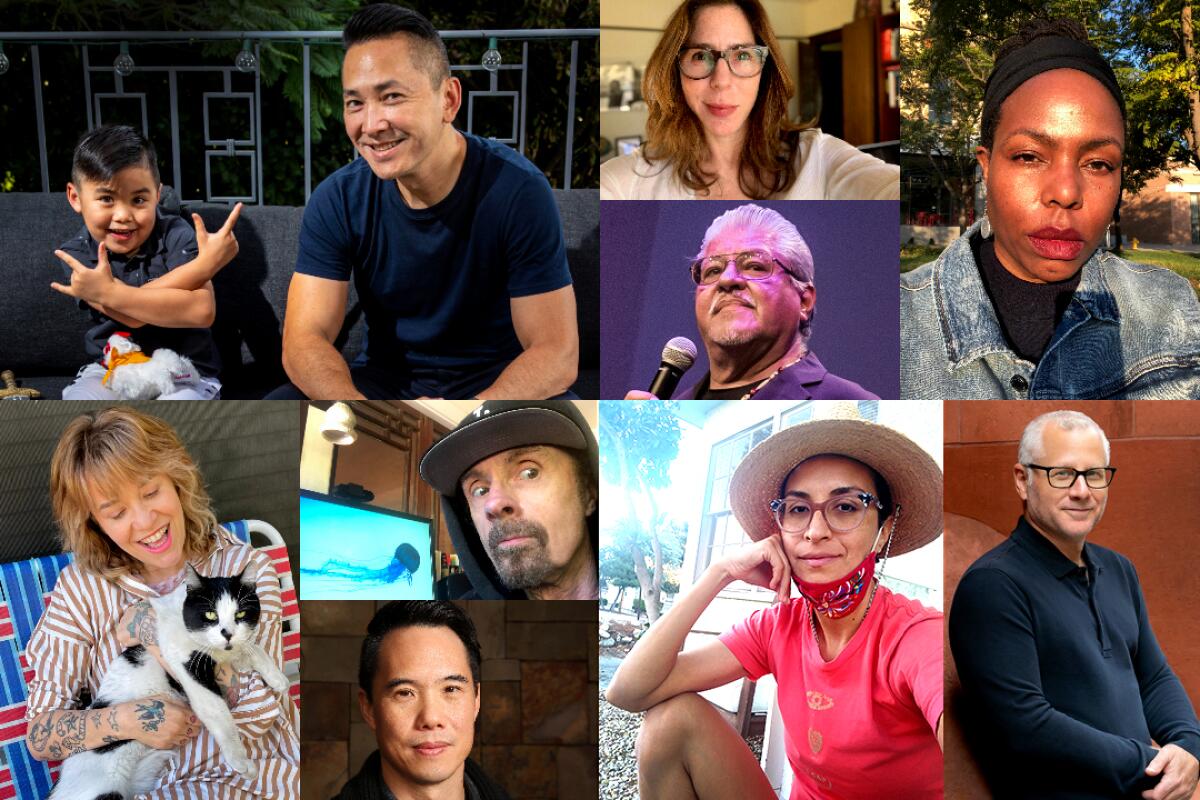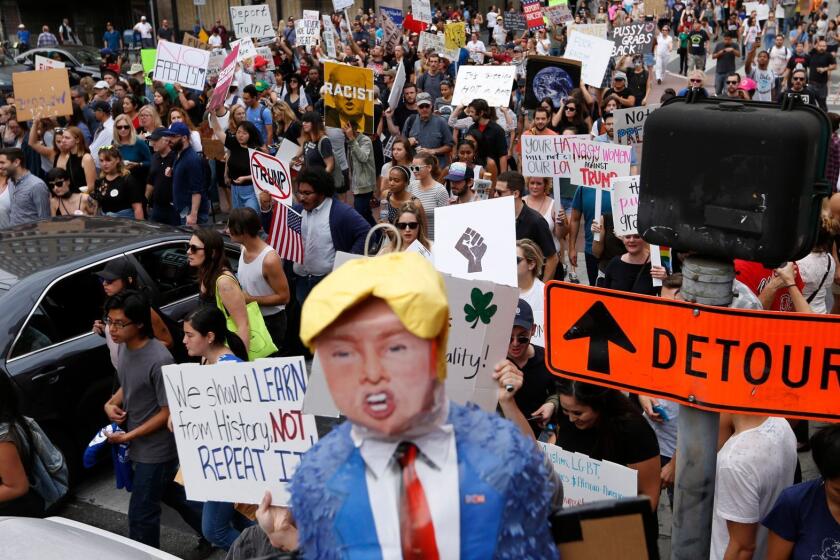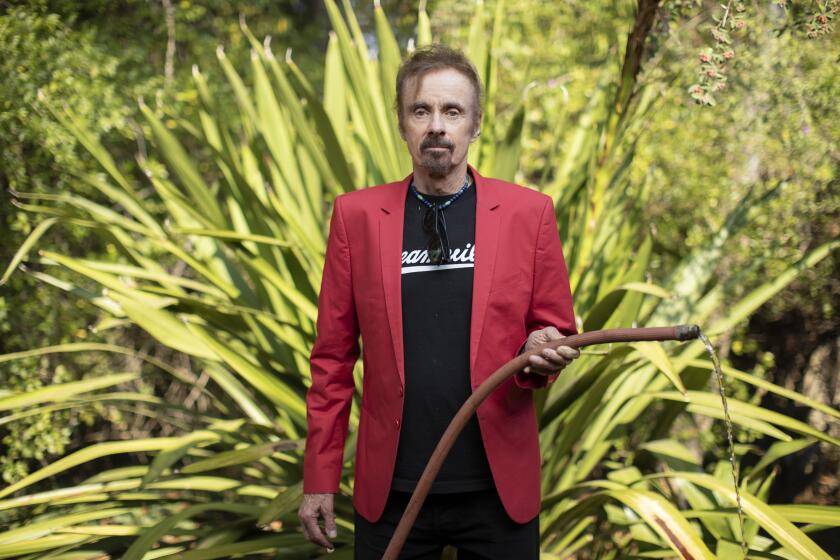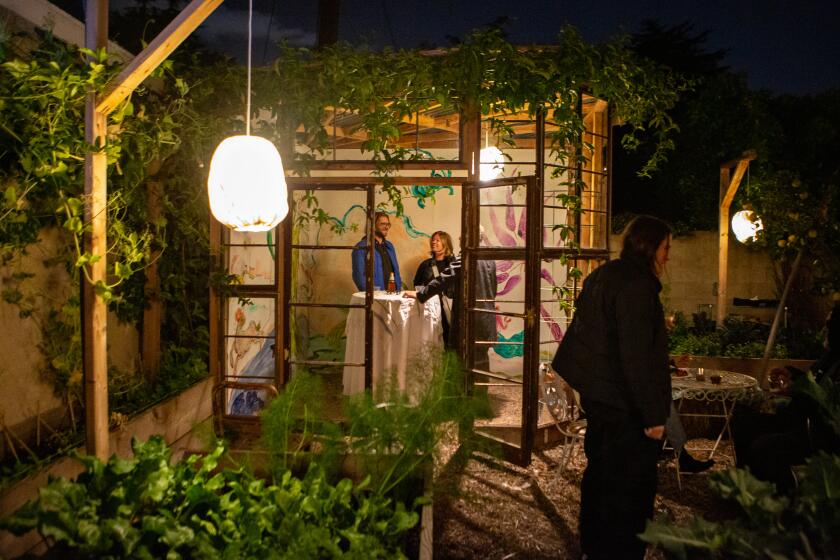How L.A.’s writers spent their two-year pandemic

- Share via
This article has been updated to include a greater diversity of voices among writers, and to acknowledge the disproportionately grave impact of the COVID pandemic on the lives of Latinx people in Los Angeles.
Two years ago, when the pandemic paused life as we knew it and many Angelenos started tending to stricken loved ones, stuck-at-home children and sourdough starters, L.A. writers started tending careers stymied by shuttered bookstores, delayed publication dates and canceled book tours.
Los Feliz mystery writer Charles Finch put fiction aside to write his 2021 memoir, “What Just Happened: Notes From a Long Year.” Highland Park journalists Geoff Manaugh and Nicola Twilley published “Until Proven Safe: The History and Future of Quarantine.”
Others were forced to set aside work entirely to focus on child-rearing, healthcare and even grief, especially in L.A. communities hit hardest by the virus. In May of that long year, a coalition of writers’ organizations petitioned the L.A. City Council for emergency relief, arguing, “Our city cannot afford to leave writers behind.”
Shortly after lockdown began, The Times commissioned writers’ quarantine diaries, yielding entries like novelist Anna Solomon’s: “An eight-city tour was in the works. I know my loss is minuscule in the scheme of losses right now.” The June 2020 piece concluded, “It’s well worth listening to these voices, because whatever future we can imagine ourselves into next might depend on them.”
That imagined future is now upon us. We asked nine Los Angeles writers what they’ve done with this crazy time and what it’s done to them.
Over the last three months, 17 writers provided diaries to the Times of their days in isolation, followed by weeks of protest. This is their story.
CHANGE OF PLANS
I’d just published my first book of nonfiction and was getting ready to publish my short story collection. I was excited to move back home from Fresno to L.A. with two new books and a child and a new baby. My daughters could spend more time with their grandmas and I could focus more on writing. Instead we came home to a pandemic lockdown and a lot of uncertainty. —Carribean Fragoza
I had just finished “The Committed,” my sequel to “The Sympathizer.” It was supposed to come out later in 2020. The pub date was pushed back to early 2021 because of the pandemic and the fear that the presidential election would distract everyone. Just before the lockdown, I had a meeting at a Santa Monica hotel about the TV adaptation of “The Sympathizer.” I stayed behind after the meeting, and the bartender sent me a lot of free cocktails he was experimenting with. I stopped on the way home to buy some pants. That was my last in-store clothing purchase. Proud to say I still fit into those pants. — Viet Thanh Nguyen
The pandemic really forced me to take stock of my efforts. I realized I’d spent years working on TV projects that hadn’t gone anywhere. I decided to work on some book projects and return to TV dreams only after I’d published some new titles. I quickly sold a memoir, so it felt like the universe was applauding my choice. — Michelle Tea
I was working on new poems, short fiction, new essays, and trying to promote my play, “Always Running,” co-written with Hector Rodriguez, which had a sell-out run in Boyle Heights in 2019. The pandemic killed any momentum for the play and my new book, “From Our Land to Our Land.” But I’m still writing. I have in mind four new books that I began when the pandemic first hit. – Luis J. Rodriguez
Steph Cha shares a meal and some notes on performing identity with the “Interior Chinatown” author.
My novel “Interior Chinatown” had just come out, so I was looking forward to a number of festivals and other literary events throughout the spring and summer. They started getting canceled one by one, and then pretty much everything was canceled. — Charles Yu
I was working on a novel. But then I was asked to write a story for the New York Times Magazine modeled on “The Decameron,” and so I put my novel on hold and read “The Decameron” and wrote a story inspired by it. I also watched [Pier Paolo] Pasolini’s version of “The Decameron” and took careful note that there is no suffering, disease or death anywhere in sight. Just sex and shenanigans. This seemed important. — Rachel Kushner
I was working on short stories, and the one I wrote in mid-March, “The Thirteenth Day,” addressed the pandemic just as it was breaking out. It is set on one of the cruise ships that were turned away from port after port when the infection crept aboard. My agent felt it was too (comically) disturbing to send out under the uncertain circumstances, so he held it until recently. Esquire has just brought it out online. — T.C. Boyle
LOSSES
My community of Pacoima/San Fernando/Sylmar was ground zero for the worst COVID-19 cases and deaths in the country. Many of our neighbors died. I’ve been blessed — nobody in my home compound got sick. But the first two months after the COVID-19 lockdowns, I lost $50,000 worth of speaking and reading gigs. We thought we’d lose our home when the IRS and a granddaughter’s student loan institution put liens on the house. But with help from friends, and then getting Social Security and Medicare, and doing curriculums for my prison writing workshops, our finances picked up. The family is now safe and strong. — Rodriguez
Two people in my extended family died of COVID, and that was very hard and sad. And a third, my uncle, died indirectly from the pandemic, afraid to go to the ER. Priorities of care, of friends and family — yes, those were altered to a degree, but writing is its own inviolable thing. Fiction is a drive, a way to be and feel and live. Nothing could alter that unless I was running for my life. The unexpected is what keeps me sharp. So you can stay home and watch Criterion Channel and read Balzac novels and think you’re living your best life, etc., but something profound goes missing, which is the rush and thickness of a populated world, the angles at which you meet, or don’t, other people. — Kushner
Donald Trump has triumphed, an accomplishment that many, except his most ardent supporters, deemed to be impossible.
New fiction was too difficult to write during lockdown, when I was also worried about dirty dishes or my bored or snack-hungry children. COVID has exacerbated ongoing problems like housing insecurity, lack of access to healthcare. These are not abstract issues. They affect me personally and the people I love. Instead, I focused on nonfiction. I received a modest grant to start a new online cultural criticism magazine by and for women of color, a long-standing dream of mine. It got off to a beautiful start before I realized it was not sustainable. Writing and editing while homeschooling a fourth grader and raising a toddler felt impossible. It was heartbreaking, actually. I had to end the magazine before it really had a chance to live. — Fragoza
If it weren’t for COVID, I would have traveled to Florida, where much of my new novel is set, to check out certain locations. I was not able to do that because of the fear of winding up in the ICU with one tube shoved down my throat and the other up my posterior orifice. I relied on memory and what I could glean online to float me through those scenes. — Boyle
CONSOLATIONS
I don’t have children. I know that’s a completely different story. But honestly, the pandemic made it easier to focus on my novel. USC, where I teach, went virtual. Sometimes it felt like that classic episode of “The Twilight Zone,” “Time Enough at Last,” where Burgess Meredith finally gets to read all the books he wants after a disaster. On the other hand, it was often difficult to concentrate because everything felt so fraught and uncertain. — Dana Johnson
It was a godsend to have a project already underway during those first few nightmarish months of quarantine. The book became my main priority — I literally had nothing else to do — and one of my few connections to “normal life.” It’s no exaggeration to say that it was the thing that kept me sane. — Tom Perrotta
T.C. Boyle, prolific and funny, discusses our losing battle against nature and his new novel, ‘Talk to Me,’ about a perennial fixation: chimpanzees.
I pursued my obsessive/compulsive occupation as always, with the exception that I still haven’t gotten to go back out into society. I finished the story collection “I Walk Between the Raindrops,” which comes out this year, and began the next novel, “Blue Skies,” which I delivered to my publisher last month. — Boyle
LONG COVID
During this time I’ve realized that being on tour has given me some of the peak moments of my life. This August we’re bringing back an original version of the 1990s feminist performance tour Sister Spit. Co-founder Sini Anderson and I have gathered a great group of writers, including some who published books during the pandemic and didn’t get the chance to promote them. Really hoping everything will be back to normal enough by then. — Tea
It’s been bewildering and frustrating and depressing to have lived this way for more than two years, and these pandemic years also felt inevitable, a slow-moving disaster that we saw coming from the start of the previous presidency. I suppose my writing is and will be in conversation with all of that. — Johnson
The pandemic has only heightened my sense of the preciousness of life and the limited time we have on Earth. Better work while I can ... — Perrotta
What most stands out from a recent Frieze week party at Del Vaz Projects, an art space housed in Shirley Temple’s childhood home, is not so much the memory of Instagrammable ephemera or bacchanalian events but rather a feeling of open-heartedness.
It is very difficult for me to say no to new projects, but it’s something I’ve had to do for my own mental health. I’m now trying to prioritize wellness over hustle. I am learning to be more selective as I try to focus my pursuits in writing, rather than chase after every opportunity. — Fragoza
COVID has made me think about how other writers have been influenced by pandemics. What about the Lost Generation of the 1920s? Their aesthetic is usually attributed to World War I, but maybe the 1918 influenza pandemic was also to blame. The Lost Generation sure had a lot of fun and wrote some great novels, so I’m looking forward to all the partying and writing once COVID is done. — Nguyen
I found immense energies to write more but also consider other ways to apply my language skills. I’m now running for California governor. My oldest son, Ramiro, and I are pushing our own production company, Barking Rooster Entertainment, for films, docs, books, plays, internet content and more. I’m excited about the future. I understand the pandemic is still here. And war has risen its ugly head again. This is precisely when we should do more. It’s time to be the dream and the dreamer, the weave and the weaver, as an Indigenous song from Mexico says. — Rodriguez
Maran is the author of “The New Old Me” and a dozen other books. She lives in Silver Lake.
More to Read
Sign up for our Book Club newsletter
Get the latest news, events and more from the Los Angeles Times Book Club, and help us get L.A. reading and talking.
You may occasionally receive promotional content from the Los Angeles Times.












